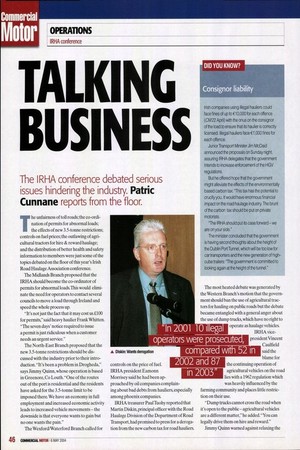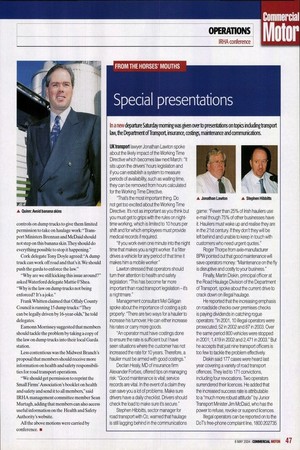TALKING BUSINESS
Page 46

Page 47

If you've noticed an error in this article please click here to report it so we can fix it.
The IRHA conference debated serious issues hindering the industry. Patric
Cunnane reports from the floor.
The unfairness of toll roads; the co-ordination of permits for abnormal loads; the effects of new 3.5-tonne restrictions; controls on fuel prices; the outlawing of agricultural tractors for hire & reward haulage; and the distribution of better health and safety information to members were just some of the topics debated on the floor of this year's Irish Road Haulage Association conference.
The Midlands Branch proposed that the IRHA should become the co-ordinator of permits for abnormal loads.This would eliminate the need for operators to contact several councils to move a load through Ireland and speed the whole process up.
"It's not just the fact that it may cost us 1.100 for permits," said heavy haulier Frank Whitten. "The seven days' notice required to issue a permit is just ridiculous when a customer needs an urgent service."
The North-East Branch proposed that the new 3.5-tonne restrictions should be discussed with the industry prior to their introduction. "It's been a problem in Drogheda," says Jimmy Quinn, whose operation is based in Greenore, Co Louth. "One of the routes out of the port is residential and the residents have asked for the 3.5-tonne limit to be imposed there. We have an economy in full employment and increased economic activity leads to increased vehicle movements the downside is that everyone wants to gain but no one wants the pain." The Wexford/Waterford Branch called for controls on the price of fuel. IRHA president Eamonn Morrisey said he had been ap
proached by oil companies complaining about bad debts from hauliers, especially among phoenix companies.
IRHA treasurer Paul Tuohy reported that Martin Diskin, principal officer with the Road Haulage Division of the Department of Road Transport, had promised to press for a derogation from the new carbon tax for road hauliers. The most heated debate was generated by the Western Branch's motion that the government should ban the use of agricultural tractors for hauling on public roads but the debate became entangled with a general anger about the use of dump trucks, which have no right to
operate as haulage vehicles. IRHA vicepresident Vincent Caulfield said the blame for the continuing operation of agricultural vehicles on the road lies with a 1962 regulation which
was heavily influenced by the farming community and places little restriction on their use.
"Dump trucks cannot cross the road when it's open to the publicagricultural vehicles are a different matter," he added. "You can legally drive them on hire and reward." Jimmy Quinn warned against relaxing the
controls on dump trucks to give them limited permission to take on haulage work: "Transport Ministers Brennan and McDaid should not step on this banana skin. They should do everything possible to stop it happening."
Cork delegate Tony Doyle agreed: "A dump truck can work off road and that's it.We should push the garda to enforce the law."
"Why are we still kicking this issue around?" asked Waterford delegate Mattie O'Shea. "Why is the law on dump trucks not being enforced? It's a joke."
Frank Whitten claimed that Offaly County Council is running 15 dump trucks:"They can be legally driven by 16-year-olds," he told delegates.
Eamonn Morrissey suggested that members should tackle the problem by taking a copy of the law on dump trucks into their local Garda station.
Less contentious was the Midwest Branch's proposal that members should receive more information on health and safety responsibilities for road transport operations.
"We should get permission to reprint the Small Firms' Association's booklet on health and safety and send it to all members," said IRHA management committee member Sean Murtagh, adding that members can also access useful information on the Health and Safety Authority's website. All the above motions were carried by conference. • Consignor liability
Irish companies using illegal hauliers could face fines of up to €10,000 for each offence (CM 22 April) with the onus on the consignor of the load to ensure that its haulier is correctly licensed. Illegal hauliers face €1,000 fines for each offence.
Junior Transport Minister Jim McDaid announced the proposals on Sunday night, assuring IRHA delegates that the government intends to increase enforcement of the HGV regulations.
But he offered hope that the government might alleviate the effects of the environmentally based carbon tax: "This tax has the potential to crucify you. It would have enormous financial impact on the road haulage industry. The brunt of the carbon tax should be put on private motorists.
"The IRHA should put its case forward -we are on your side."
The minister concluded that the government is having second thoughts about the height of the Dublin Port Tunnel, which will be too low for car transporters and the new generation of highcube trailers: "The government is committed to looking again at the height of the tunnel."


























































































































































































